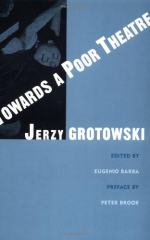
|
| Name: _________________________ | Period: ___________________ |
This test consists of 5 multiple choice questions, 5 short answer questions, and 10 short essay questions.
Multiple Choice Questions
1. "Akropolis: Treatment of the Text" was written by the literary adviser to The Laboratory, named _____.
(a) T.K. Wiewioroswki.
(b) Michael Sosnowski.
(c) Ludwik Grotowski.
(d) Ludwik Flaszen.
2. "He Wasn't Entirely Himself" was an article originally published when?
(a) 1967.
(b) 1969.
(c) 1968.
(d) 1965.
3. In "The Theatre's New Testament," Grotowski says, "The elaboration of artificiality is a question of _____ - sounds and gestures - which evoke associations in the psyche of the audience."
(a) Holograms.
(b) Ideograms.
(c) Signals.
(d) Archetypes.
4. What is the term for Brecht's "alienation effect"?
(a) Verisimilitude.
(b) Athenheimstsard.
(c) Mankwovwsvyt.
(d) Verfremdungseffekt.
5. Who developed bio-mechanical training for the actor?
(a) Brecht.
(b) Beckett.
(c) Stanislavski.
(d) Meyerhold.
Short Answer Questions
1. Whose investigations of extroversive and introversive reactions are incorporated into Grotowski's system?
2. The technique of the "holy actor" is _____.
3. Where does the action of "Akropolis" take place in the text?
4. Whom is Faustus arguing with in the opening scene of Grotowski's production?
5. Who did Artaud write a letter to which said, "I am not entirely myself?"
Short Essay Questions
1. In what ways does Grotowski describe the actor as one who sacrifices in "The Theatre's New Testament"?
2. What is Grotowski's take on "artifice" and what does he define this as in "Towards a Poor Theatre" (Chapter 1)?
3. How does Grotowski reinterpret the theme of "Dr. Faustus"?
4. What does Grotowski write of the "life-mask" in "Towards a Poor Theatre" (Chapter 1)?
5. Describe the comparison of the Laboratory to the Bohr Institute.
6. How is Dr. Faustus considered a saint and martyr in the play produced by Grotowski?
7. How did Grotowski adapt the text of "Dr. Faustus" from the original script?
8. How does the resetting of "Akropolis" change the central question of the play?
9. How does Grotowski reverse Faustus' intention in the last monologue of "Dr. Faustus"?
10. How does Grotowski answer the interviewer in "The Theatre's New Testament" about the association of the Theatre Laboratory with science?
|
This section contains 871 words (approx. 3 pages at 300 words per page) |

|




